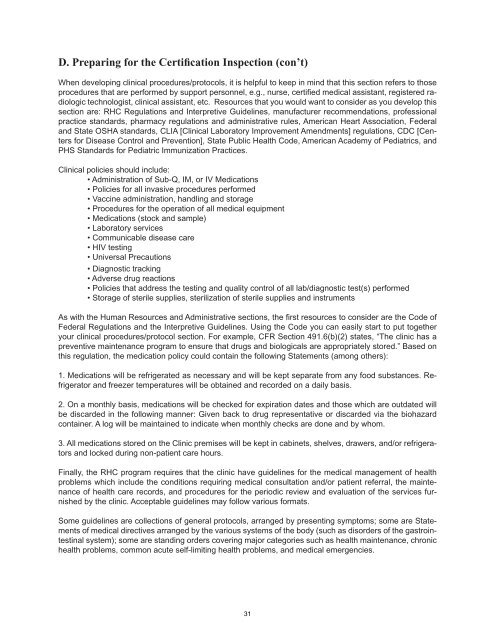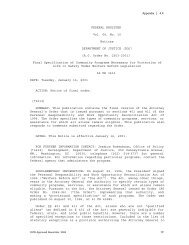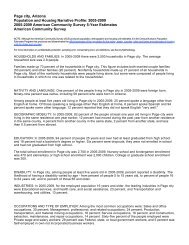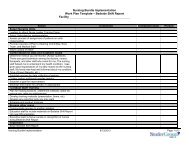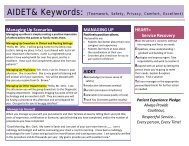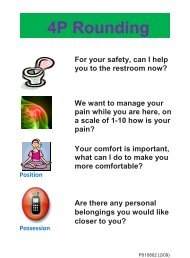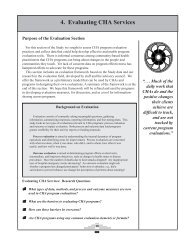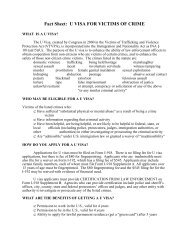Arizona Rural Health Clinic Designation Manual - Arizona Center for ...
Arizona Rural Health Clinic Designation Manual - Arizona Center for ...
Arizona Rural Health Clinic Designation Manual - Arizona Center for ...
You also want an ePaper? Increase the reach of your titles
YUMPU automatically turns print PDFs into web optimized ePapers that Google loves.
D. Preparing <strong>for</strong> the Certification Inspection (con’t)<br />
When developing clinical procedures/protocols, it is helpful to keep in mind that this section refers to those<br />
procedures that are per<strong>for</strong>med by support personnel, e.g., nurse, certifi ed medical assistant, registered radiologic<br />
technologist, clinical assistant, etc. Resources that you would want to consider as you develop this<br />
section are: RHC Regulations and Interpretive Guidelines, manufacturer recommendations, professional<br />
practice standards, pharmacy regulations and administrative rules, American Heart Association, Federal<br />
and State OSHA standards, CLIA [<strong>Clinic</strong>al Laboratory Improvement Amendments] regulations, CDC [<strong>Center</strong>s<br />
<strong>for</strong> Disease Control and Prevention], State Public <strong>Health</strong> Code, American Academy of Pediatrics, and<br />
PHS Standards <strong>for</strong> Pediatric Immunization Practices.<br />
<strong>Clinic</strong>al policies should include:<br />
• Administration of Sub-Q, IM, or IV Medications<br />
• Policies <strong>for</strong> all invasive procedures per<strong>for</strong>med<br />
• Vaccine administration, handling and storage<br />
• Procedures <strong>for</strong> the operation of all medical equipment<br />
• Medications (stock and sample)<br />
• Laboratory services<br />
• Communicable disease care<br />
• HIV testing<br />
• Universal Precautions<br />
• Diagnostic tracking<br />
• Adverse drug reactions<br />
• Policies that address the testing and quality control of all lab/diagnostic test(s) per<strong>for</strong>med<br />
• Storage of sterile supplies, sterilization of sterile supplies and instruments<br />
As with the Human Resources and Administrative sections, the fi rst resources to consider are the Code of<br />
Federal Regulations and the Interpretive Guidelines. Using the Code you can easily start to put together<br />
your clinical procedures/protocol section. For example, CFR Section 491.6(b)(2) states, “The clinic has a<br />
preventive maintenance program to ensure that drugs and biologicals are appropriately stored.” Based on<br />
this regulation, the medication policy could contain the following Statements (among others):<br />
1. Medications will be refrigerated as necessary and will be kept separate from any food substances. Refrigerator<br />
and freezer temperatures will be obtained and recorded on a daily basis.<br />
2. On a monthly basis, medications will be checked <strong>for</strong> expiration dates and those which are outdated will<br />
be discarded in the following manner: Given back to drug representative or discarded via the biohazard<br />
container. A log will be maintained to indicate when monthly checks are done and by whom.<br />
3. All medications stored on the <strong>Clinic</strong> premises will be kept in cabinets, shelves, drawers, and/or refrigerators<br />
and locked during non-patient care hours.<br />
Finally, the RHC program requires that the clinic have guidelines <strong>for</strong> the medical management of health<br />
problems which include the conditions requiring medical consultation and/or patient referral, the maintenance<br />
of health care records, and procedures <strong>for</strong> the periodic review and evaluation of the services furnished<br />
by the clinic. Acceptable guidelines may follow various <strong>for</strong>mats.<br />
Some guidelines are collections of general protocols, arranged by presenting symptoms; some are Statements<br />
of medical directives arranged by the various systems of the body (such as disorders of the gastrointestinal<br />
system); some are standing orders covering major categories such as health maintenance, chronic<br />
health problems, common acute self-limiting health problems, and medical emergencies.<br />
31


